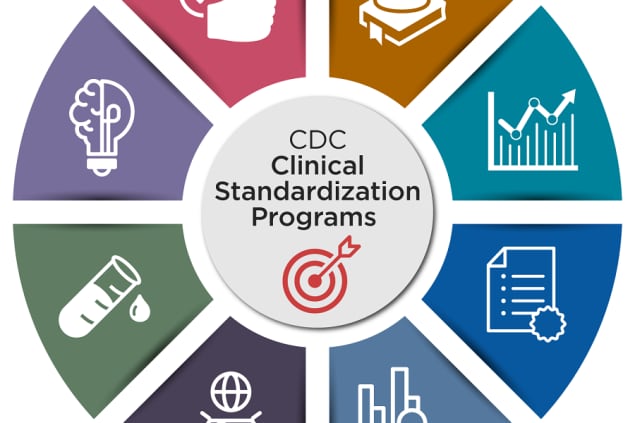Clinical Laboratory Standardization

Mission: Improve diagnosis, treatment, and prevention of selected diseases by standardizing clinical laboratory measurements
Objective: Create measurement results that have the same analytical accuracy and precision and, therefore, are comparable across methods, locations, and time
Clinical Standardization Programs improve the accuracy and reliability of laboratory tests for key chronic biomarkers, such as those used in tests for diabetes, kidney disease, bone disease, cancer, heart disease, and thyroid disease. In the United States, approximately 14 billion laboratory tests are performed annually in more than 266,000 Clinical Laboratory Improvement Amendments (CLIA)-certified laboratories.
The Problem
Laboratory tests used in patient care and public health are not always accurate and reliable enough for making medical or public health decisions. For instance, tests on the same patient blood sample have shown different vitamin D levels, depending on the laboratory.
According to a National Academy of Medicine report, different laboratories could reach different conclusions about vitamin D levels for the same patient. Similar observations were made with tests for other chronic disease biomarkers or indicators of health conditions.
The Solution
CDC Clinical Standardization Programs (CSPs) can help laboratories and test manufacturers improve their analytical performance to help people attain better health outcomes. Laboratory standardization is achieved when test results have the same analytical accuracy and precision across measurement systems, laboratories, and time.
With tests that are standardized, health care providers and public health professionals can make evidence-based clinical decisions more easily. Laboratory standardization allows them to
- Apply evidence-based clinical practice guidelines with confidence
- Put patient-care research findings into practice effectively
- Exchange laboratory test data across health care systems
- Save costs to the health care system
CDC CSPs improve the accuracy and reliability of laboratory tests for key chronic biomarkers, such as those used in tests for diabetes, kidney disease, bone disease, cancer, heart disease, and thyroid disease. CDC CSPs collaborate with laboratories, test and assay manufacturers, professional organizations, and others to assure laboratory tests meet clinical and public health needs.



